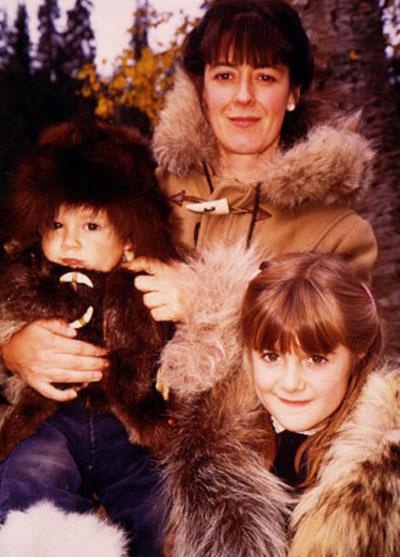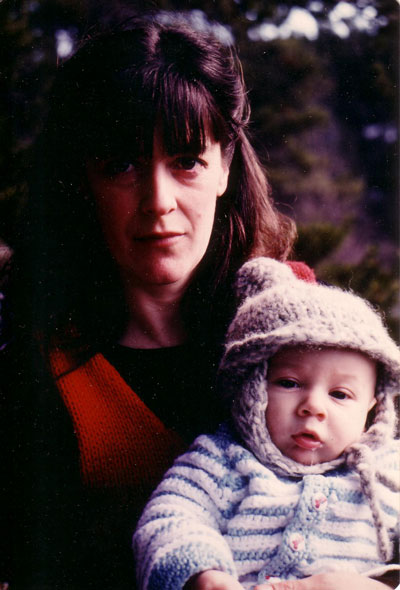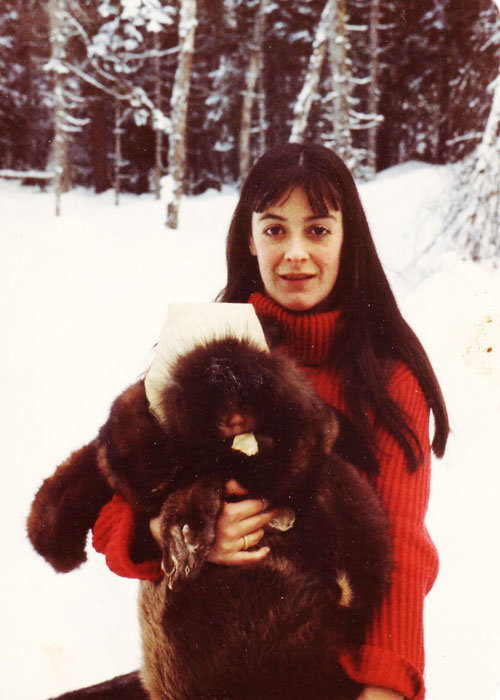#61 Deanna Kawatski
January 21st, 2016

LOCATION: Ningunsaw Valley, B.C.
DIRECTIONS: Find Highway 37 on a map of northern B.C. If you squint, you will see the Ningunsaw River, only about 30 miles long. The Ningunsaw flows into the Iskut, which flows into the Stikine; so Ningunsaw Valley is part of the Stikine watershed. Kawatski lived on the Ningunsaw River about halfway between where it runs near Highway 37 and where it flows into the Iskut River. Or to locate her address-less former home, find Stewart, B.C. at end of Highway 37A, then backtrack to Meziadin Junction, then proceed north.
In the remote Ningunsaw Valley described by Deanna Kawatski in her remarkable memoir of an unlikely friendship, Clara and Me, a bottle of ketchup was a luxury item. Persevering in the bush with two children approximately 120 miles from the nearest town of Stewart, B.C., her family had to hike three miles over a rough, bog-riddled trail to reach the nearest gravel road in order to hitchhike to ‘civilization’. They routinely wore hand-me-downs. She and her husband Jay had a combined annual income of five thousand dollars — for his woodcarvings, taxidermy and snowshoe making, and for her freelance magazine articles. But Kawatski’s greatest poverty was female friendship. “For eleven years I had dreamed of having another woman within walking distance,” she writes in Clara and Me: The Story of an Unexpected Friendship (Whitecap 1996).
Kawatski’s wish was granted in 1990, but fate made a mockery of her vision. Raised among sophisticated peers in Kamloops, Kawatski had naturally yearned for a woman to share her literary concerns. Instead her neighbour for the next two years would be Clara, a ‘small bent twig of a native woman’ with no visible teeth to support her idiotic grin. Barely able to speak, Clara was the mentally challenged wife of Fritz Handel, her ingenious and kindly protector.
While the two mechanically gifted husbands disappeared to contrive homestead improvements, Clara clumsily invaded Kawatski’s privacy with slobbering affection. At first it was like having another clinging child to care for. “Most people can, at the very least, retreat to the toilet for a few moments of peace,” she recalls. “Unfortunately, Clara always saw my retreat beyond the yard to urinate as the call for an outing.”
Kawatski was often marooned in the kitchen or garden with two families to feed instead of one. In her memoir about Clara–a follow-up to her Wilderness Mother–Kawatski frankly recalls the awkwardness of incorporating Clara into her life. “At first glance Clara was ugly, and I had felt myself participate, initially, in the compulsion to reject her on that basis. And even though the impression came and went, I saw too much personality glittering within the rough ore and I was open enough to seek out other facets. But over time I witnessed the snap judgements made by others, particularly men.”
Gradually Kawatski tossed out the mentally challenged label. She accepted Clara as a baffling blend of complete idiocy, ancient wisdom, childlike mirth and anger. She recognized that Clara was the same as everyone else except she had very different proportions of the same ingredients.
“In some ways Clara had it made,” says Kawatski. “She had love, security, and far more freedom, both mentally and physically, than I had.
“Fritz gave Clara the luxury of choice and never pressured her to do more than she wanted, while I lived with a man who sometimes seemed like a tyrant.”
Kawatski’s husband resented her writing. She rose as early as 4:30 a.m. to work on her gardening journal. As their difficult marriage became an isolated battleground, Kawatski increasingly turned to her outings with Clara to escape her husband’s criticism and expand her emotional horizons.
“If depth of feeling was any measure of intelligence, then Clara was a genius.”
Particularly on their snowshoeing expeditions — which “held the rhythm of wading through clouds” — or taking their children to the river, Kawatski and Clara bonded with Mother Nature and their natures as mothers.
“With time Clara and I had merged as womanspirit. Members of the same mysterious clan… We shared our own insignificance in the big picture, and the small one as well, where a man’s opinion carried so much more weight than a woman’s.”
To thwart her increasing success as a freelancer, Kawatski’s husband served an ultimatum in writing: stop writing or see a lawyer for a divorce. In support of Deanna Kawatski’s need to leave Ningunsaw Valley, Fritz Handel and Clara also left their home, returning to the bush north of Iskut Village. Kawatski’s Wilderness Mother became a Book of the Month selection in 1994. Clara and Me was shortlisted for the Hubert Evans Award in 1997.
Having been a contributing editor to Mother Earth News, Deanna Kawatski now lives on a farm at Shuswap Lake with her daughter and son, and new partner, Eric. “From Clara I learned patience, tolerance, and the capacity to stand up for myself more often. She showed me that no matter how uneducated or intellectually stunted we are, somewhere within dwells a spirit with clenched fist and chin held high, which will rise in defence of itself.
“Call it human dignity or the survival instinct. Without it we won’t survive in our full capacity. The soul light can be turned down to a mere flicker by the blackness of oppression. Clara reminded me that I had rights and not to tolerate their violation.
“What I learned about communication from Clara was the vital need for all of us to be understood. And that what we all need most apart from basic physical demands is acceptance. And love.”
Deanna Kawatski was contacted by friends on April 21, 2012 to let her know that Fritz and Clara’s snowmobile went through the ice on Lake Kluachon, at the headwaters of the Iskut River. Fritz fought for their lives for an hour and twenty minutes but Clara did not survive. “It is unbelievable that Fritz could live in the icy water for so long,” she said. Fritz was only rescued because a couple of men making a dump run, (on an out-of-routine day) spotted something bobbing in the lake and, thinking it must be an animal, investigated. The men risked their own lives since it took poles and ropes to execute the rescue. Fritz was medivacked to the hospital in Terrace about three hundred miles south and he survived.
“This was a sad ending for my unique friend,” said Kawatski. “Clara couldn’t swim and was actually afraid of water. Erma, an acquaintance told me it was a completely calm day but right after Clara died a whirlwind swept through Iskut Village. It was spirit, she said. I feel lucky to have been so close to Clara for those final two years of my bush life.”
—
Deanna Kawatski was born in Salmon Arm on April 11, 1951. She reluctantly left Shuswap Lake in 1956 and grew up in Kamloops, returning in the summers to Shuswap Lake. She attended UBC, intending to study creative writing, but took off for Europe. For the next eight years she travelled, making an overland trip from Berlin to India in 1972. She lived in Berlin for a year working as a maid for the American Army, and then as a harpsichord builder. She was also employed as a nanny in London and as a worker in a home for emotionally disturbed children in Edinburgh.
Kawatski flew back to Canada to work as one of the first female tree planters in B.C. In the summer of 1974, having written her first novel in Paris, she met George Ryga at the Penticton Summer School of the Arts and he became her mentor. In 1975, on a flight back from Edinburgh, she happened to sit beside W.O. Mitchell, who encouraged her to apply for his program at the Banff School of Fine Arts. She was accepted and spent six weeks studying with Mitchell.
Her first poem was published in a literary magazine in London in 1978. That year she went to live in northwestern B.C. to work as a lookout attendant for the B.C. Forest Service. Jay, the local hermit, became her husband. She spent the next 13 years living in the wilderness and wrote about it in Wilderness Mother and Clara and Me. She also wrote numerous magazine articles which have appeared in Harrowsmith, Country Journal, Canadian Gardening, Outdoor Canada, and most prominently, Mother Earth News.
In 1992 Deanna Kawatski and her two children returned to Shuswap Lake. They have subsequently lived in Celista, B.C., on Garland Gracesprings Farm with her partner, Eric. Deanna Kawatski remains an avid reader, gardener, cyclist, hiker, and naturalist.
Burning Man, Slaying Dragon: My True & Transformative Travel Tale (Gracesprings Collective 2012) is a dual memoir that recalls Kawatski’s overland trip to India via Turkey as a young hippie at age 21 as she simultaneously narrates her much later journey to the Burning Man Festival at the Black Rock Desert in Nevada with her 23-year-old daughter Natalia.
In 2014, Deanna Kawatski published a book about saving ancient trees in B.C., Big Trees Saved and Other Feats: The story of the Shuswap Environmental Action Society (Shuswap Press 2014). It covers 25 years in the life of a group of grassroots activists who stood up for what they believe. “This book confirms my suspicions about human kind,” writes Joe Foy, National Campaign Director of the Wilderness Committee in the book’s foreword. ”Not everything that people do is about self-interest. Sometimes people really do devote themselves to the benefit of future generations. The story of the Shuswap Environmental Action Society is an inspiring saga of regular people making a huge difference – such a huge difference in fact that you can not only read their story in this book, you can see it from outer space! I encourage you to go to Google Earth and have a look at the precious ancient forests that SEAS was able to gain protection for – and to contemplate the ocean of clear cuts that surround them.” This book was reviewed by BC Historical Quarterly: http://www.bcstudies.com/?q=book-reviews/natural-selection-building-conservation-community-sidney-island
BOOKS:
Big trees saved and other feats (Shuswap Press 2014) 978-0-9917873-7-1
Samira, the Singing Salmon (Gracesprings Collective 2014) 978-0-9809608-8-4
Burning Man, Slaying Dragon: My True & Transformative Travel Tale (Gracesprings Collective 2012)
Stalking the Wild Heart (Gracesprings Collective 2009)
Clara and Me, The Story of an Unexpected Friendship (Whitecap 1996)
Wilderness Mother (Lyons & Burford, New York, Whitecap, 1994)
Bird, Bubble and Stream (written under maiden name, Barnhardt) (Fiddlehead Press, 1980)
[BCBW 2015]
Stalking the Wild Heart
By SUSAN DUNCAN (City Editor, Kamloops Daily News, November 24, 2009)
She lives in Celista in an old farmhouse with a big, cozy kitchen. A wood stove provides much of the heat. Homemade cookies cool on a rack.
Lulu, a black lab, snoozes on the floor. A black steer outside the window grazes contentedly on grass.
The location is not as remote as where Deanna Barnhardt Kawatski wrote her popular book, Wilderness Mother, but it still has enough of the back country atmosphere to inspire creativity.
Not that Kawatski needs much motivation to put pen to paper — and she does that literally. Writing, as her partner, Eric Procunier, told her, “is so much who you are. You write every day.”
That conversation occurred recently when Kawatski walked outside to where Procunier was working and announced, “That’s it. I’m done. I’m not going to write again.”
Procunier said he momentarily felt concerned, but then realized that was not possible for her.
Reflecting back on her comments, Kawatski couldn’t recall what exactly made her come to that conclusion. However, she does know, that writing is tough.
“Everybody secretly thinks they can write a book. They have no idea,” she said and then she laughs.
Acclaimed author Philip Roth would agree. He once noted there are a few things in life that are too hard and writing is one of them.
Yet, Kawatski said, many people are flooding the literary scene with inferior works because they don’t realize what is needed to produce a quality book. While she admitted her comment might not be popular, she wishes those would-be authors would spend more time acquiring writing skills before attempting to publish their material.
“Professional editing — I think it’s a must. Get another view. Often when we write for a long time, we can’t see the forest for the trees.”
Kawatski has been writing for more than 30 years. She wrote her first book in Paris when she was 23 years old.
“I just read it over the other day, “ she said, letting loose another peal of laughter at her youthful writing.
“Here I was in Paris and I was actually writing about Shuswap Lake, instead of Paris.”
Kawataski, then Deanna Barnhardt, grew up in Kamloops but spent as much time at the Shuswap Lake where her grandmother still owned the family property in Magna Bay.
A chance encounter with W. O. Mitchell helped Kawatski realize the need to develop her own literary skills. She was on a plane in 1974, when the man sitting beside her noticed her scribbling in her journal — something she continues to do daily.
Are you a writer? he asked. She replied that she loved to write, never daring to call herself an actual writer. He introduced himself and during the following four-hour conversation, Mitchell convinced her to attend the Banff School of Fine Arts in the next year where he would be teaching a session.
When she talks about writing being exhausting, she knows of what she speaks. She spends years on one book. Although she has a computer, she first writes her manuscripts by hand, sometimes more than one draft.
She has written five books, four of them published and the fifth waiting for a decision on whether she will self-publish or let her agent look for a publishing house.
Published through the Gracesprings Collective, her latest book, Stalking The Wild Heart, is a novel that again draws on her life experiences.
She is most happy with the reaction from the North Shuswap community. She launched it in September at the Celista hall with a night of music and readings from the book. She expected 25 or 30 people. She got more than 100.
“(Last weekend) I was at the local craft fair and I sold 27 books. I was so thrilled,” she said. “They are really avid readers out here.”
Writing a popular book should not be new to her. Wilderness Mother is described in writing circles as a classic, and Clara and Me touches the heart of anyone who reads it. But she still delights in knowing people appreciate her stories.
“When people buy your book, it’s so important. I’m constantly struck by people’s lack of reality about writers. They think once you have published a book, you are rich. That is such a myth. There are so few writers who are rich.”
When a book is published professionally, the author gets $2.50 if the book sells for $25. That’s one of the advantages of self publishing, although the author also has all the costs of printing.
Fortunately, she said, she has always lived frugally so she’s doing OK.
And is she really done with writing? Procunier can relax. He’s right. It’s who she is.
“I have a lot of stories left to tell,” she confessed.
But, for the moment, Kawatski will concentrate on publicizing Stalking The Wild Heart.
“I need to fill my creative well for awhile. Once you take the plunge, once I commit myself, there is no turning back. Even if I’m not at my desk writing, part of my mind is always occupied with the book.”
ALSO:
When she is not writing, Deanna Barnhardt Kawatski is engaged in other literary pursuits. She gives writing workshops, makes presentations at workshops, attends writers’ retreats and festivals, and gives readings. Since Wilderness Mother was published in 1994, she has given 65 readings. Her next reading featuring passages of Stalking The Wild Heart is Nov. 28 at Vertigo Gallery in Vernon from 1 p.m. to 2 p.m. Kawatski’s books are available in Kamloops at Chapter’s, Bookland and Second Glance for $28.
In her early days of writing, she focused on magazine articles and in 1994-95, she wrote a series of articles for Mother Earth News called the Shuswap Diaries. She also wrote for Country Journal and it was a cover story there that attracted the attention of two American publishing companies encouraging her to write a book, which led to Wilderness Mother.
Literary non-fiction:
Wilderness Mother
Clara and Me
Poetry:
Bird, Bubble and Stream
Contemporary fiction:
Stalking The Wild Heart
In progress:
A travel memoir, Burning Man, Slaying Dragon, which includes the story of how she and her twin sister, Donna, ended up travelling to Berlin at age 20, along with Donna’s new baby.
Burning Man, Slaying Dragon: My True & Transformative Travel Tale
Review (2013) By Shelly Corbin
What do you do when you’re approaching fifty and your twenty-something daughter invites you to an arts-festival adventure for which the tickets state, “You voluntarily assume the risk of serious injury or death by attending”?
Well, if you come from the B.C. Interior where nearly nine hundred forest fires are raging, of course, you agree to go to the Burning Man Festival in the Black Rock Desert.
However, it’s not only local forest conflagrations and the blazing creativity of artists gathered in the scorching heat of the Nevada desert that Barnhardt-Kawatski must confront and survive. Breathing deeply into her past, she also must face, once again, the suffocating anxiety and searing self-doubt that threatened to consume her when she was a young woman. Three decades earlier, in a courageous attempt to extinguish these inner fears, the author had also chosen to leave her Shuswap home. She headed for Europe and from there, made her way through the feverish intensities of the Middle East to complete her journey in the crucible of India.
Barnhardt-Kawatski demonstrates her considerable skills as she deftly interlaces the two stories of past and present. In this “true & transformative travel tale”, the writer’s attention to detail and her willingness to tell the whole and unvarnished truth engages the reader at a deeply personal level. But she also beautifully illustrates that all true literature tells a story beyond the apparent narrative.
To paraphrase writer Flannery O’Connor, we all must make our way past the dragon. And “[n]o matter what form the dragon may take, it is of this mysterious passage past him, or into his jaws, that stories of any depth will always be concerned to tell…”
Burning Man, Slaying Dragon is both an engaging read and a rich exploration of what it means to be on the human journey.





Leave a Reply